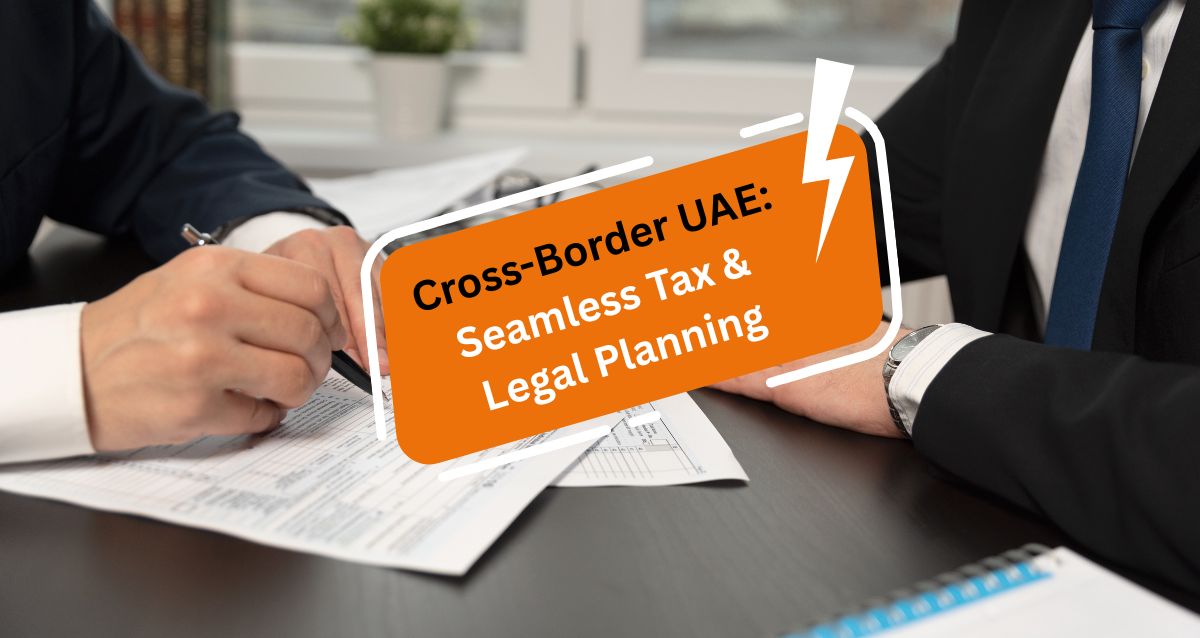UAE Cross-Border: Tax & Legal Made Easy
Disclaimer: The content in this article is for educational purposes only and does not constitute legal or tax advice. Readers are encouraged to consult qualified professionals for tailored solutions.
As UAE continues to build its status as a global hub for entrepreneurs all over the world and digital nomads, many international business owners are establishing their operations, holding companies or tax residency in the country. While the UAE offers an attractive tax regime, true cross-border tax optimisation requires integrated tax and legal planning.
Entrepreneurs with worldwide income streams, holding assets in multiple jurisdictions, and having business interests across borders must consider not only UAE tax laws but also foreign tax exposures, legal structures, reporting obligations, and long-term succession planning.
Why Integrated Planning Matters
Many entrepreneurs take a simplified approach:
- To get the benefit of 0% Corporate tax, they will set up a company in a UAE Free Zone
- Maintain foreign companies or bank accounts in multiple currencies
- Global investments in real estate or cryptocurrencies as personal investments.
- Giving low priority to succession, tax residency, and reporting obligations
This often results in:
- Forming permanent establishments (PEs) in high-tax jurisdictions which is not intended
- Income, dividends, or capital gains are double-taxed
- Failure in Compliance under CRS, FATCA, and economic substance regulations in the UAE
- Exposure to Tax inheritance or estate disputes
The solution? Implement an integrated strategy that connects corporate structuring, personal asset protection, tax residency planning, and legal frameworks across borders.
Key Tax Considerations for UAE-Based Entrepreneurs
1. Understanding UAE Corporate Tax Exposure in detail
- Mainland entities: Subject to 9% Corporate Tax on taxable profit exceeding AED 375,000
- Free Zone companies: May get the benefit of 0% Corporate tax, if they are qualifying as a Qualifying Free Zone Person (QFZP) and have no income from Excluded Activities
- Personal income: Not subject to Corporate Tax in UAE
However, earnings from abroad may still be taxable in other jurisdictions unless properly structured.
2. Avoiding Permanent Establishment (PE) Risks
If you are:
- Operating a business in different countries from Dubai
- Signing contracts or managing clients in your home country
- Using UAE entities to invoice for income from business outside the UAE
You may trigger a Permanent Establishment under the UAE’s Double Taxation Agreement (DTA) with respective countries, making income taxable in that country.
Example:
A UK entrepreneur uses their Free Zone company in the UAE to invoice EU clients, but they frequently travel, sign deals, and have a local UK staff member for dealing with business operations. UK HMRC may claim this as the existence of PE, denying 0% corporate tax benefits in the UAE.
Solution: Managing business-related matters by using independent agents, carefully defining service models that comply with DTA definitions.
Legal Structuring for Asset Protection and Compliance
1. Use of Holding Companies
- Consider RAK ICC, DIFC, or ADGM SPVs for ownership of:
- Global subsidiaries
- Intellectual property (IP)
- Bankable investments
- Real estate assets
This allows:
- Ownership of assets is centrally
- Protection of assets from personal liabilities
- Easier succession and capital restructuring
2. Family Foundations for Succession Planning
A DIFC or ADGM Foundation can hold your assets in the UAE and globally. It will,
- Removes assets from personal ownership
- Giving control and governance through bylaws
- Avoids probate, inheritance tax (in some countries), and family disputes
Example: A UK entrepreneur based in Dubai transfers shares in Cyprus and UAE companies to a Foundation in DIFC. The founder has control, but the assets are protected and succession-ready
Optimising Global Tax Exposure
1. Leverage Double Taxation Agreements (DTAs) The
UAE has 140+ DTAs, allowing:
- Either reduced or zero withholding tax on dividends, interest and royalties
- Prevention of double taxation on Global income
- Residency can be recognised based on UAE Tax Residency Certificates
Example:
A UAE holding company receives dividends from the UK and Portugal. They can reduce or eliminate withholding tax by presenting UAE TRCs in respective countries, provided the Economic substance conditions are met.
2. Foreign Tax Credit Planning
Income earned from abroad may be locally taxed. That income might also be subject to UAE corporate tax, but they allows Foreign Tax credit on the same.
To optimise:
- Avoidance of double taxation on the same income
- Evaluate credit vs. exemption methods
- Timely reporting of income and expenses for optimal relief
Regulatory & Compliance Elements
1. Economic Substance Regulations (ESR)
UAE entities carrying out Relevant Activities (e.g., Banking, Insurance, Shipping business, IP, holding, financing etc) must:
- Prove adequate substance in the UAE
- Submit ESR notifications and reports on time and manner prescribed by the authority
Failure to comply with this requirement will lead to penalties and may compromise treaty benefits.
2. UAE Tax Residency Certificate (TRC)
Entrepreneurs with significant UAE presence can apply for TRC to:
- Prove tax residency under DTAs
- Avoid foreign tax on passive income
- Protection against foreign audit claims
Requirements include:
- They must reside in the UAE for more than 183 days during the said tax period
- Ownership of the UAE company
- Holding Local bank accounts and tenancy contracts
Practical Scenarios
Scenario 1: The Amazon Seller
An Indian entrepreneur sells via Amazon US and uses a UAE Freezone company for invoicing. However, payments flow through a US warehouse, and he often visits the US. The IRS (International Reporting Standards) may claim this as PE in the US.
Solution: Establish a UAE fulfilment relationship, avoid US inventory holding, and apply DTA principles.
Scenario 2: The Startup Founder with Foreign IP
An Indian founder holds an IP (Intellectual Property) in his name, but he is operating from a Free Zone in the UAE. He licensed this IP to his startup in the UAE, but there are no legal agreements for the same.
Solution: Transfer this IP to an SPV in ADGM, covering under an arm’s-length licensing arrangement and protecting this IP globally
Flyingcolour Tax Consultant Integrated Advisory Approach
At Flyingcolour Tax Consultant, we go beyond just forming companies. We help you:
- Design group business structures internationally with proper tax and legal integration
- Providing intercompany services and IP agreements
- Helping with TRCs, ESR, and VAT registration and their timely filings
- Set up Foundations and Holding Companies in the UAE
- Coordinate with foreign tax advisors to ensure global efficiency
To learn more about Integrated Tax & Legal Planning for Cross-Border Entrepreneurs Based in UAE, book a free consultation with one of the Flyingcolour team advisors.
Disclaimer: The information provided in this blog is based on our understanding of current tax laws and regulations. It is intended for general informational purposes only and does not constitute professional tax advice, consultation, or representation. The author and publisher are not responsible for any errors or omissions, or for any actions taken based on the information contained in this blog.




